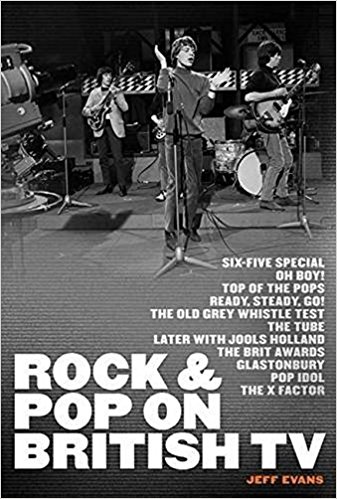
JEFF EVANS – Rock & Pop on British TV
- by J.N.
- Posted on 27-03-2018
Label:
Omnibus Press
Rating:
4 / 6
This charming 336-page exploration of rock and pop music on British TV throughout the past seven decades by author Jeff Evans is an interesting and enlightening discourse on how two different entities were linked and how they have worked in tandem ever since the 1950s. Countless different TV shows that have either incorporated or focused solely on music have come and gone over the years, and Evans’ painstaking research of every conceivable show known to man are touched on and discussed in this well-researched and nicely structured book of his. What “Rock & Pop on British TV” essentially argues and shows is just how important television was in bringing revolutionary and pioneering music to the masses and how the two have been inextricably linked ever since the family gathered around the TV back in the late 1950s and were exposed to new sounds from young and exciting bands from all over the country.
Although the huge amount of information contained within its pages is somewhat difficult to absorb and digest from time to time, one can only applaud and respect the amazing job undertaken by Evans and how many anecdotes, details, rumors, and stories that he has managed to uncover and bring to light. There is a wealth of information here on obscure and long forgotten programs that certainly played a part in helping establish the fame of certain bands and artists and yet they seemed to have been covered by the sands of time until this book suddenly appeared. Whether one is into Elton John, the Beatles, the Rolling Stones, Madonna, or perhaps Thin Lizzy, the Sex Pistols, and Deep Purple, you will find out what shows they appeared on and when. Even hugely popular events such as Glastonbury, Pop Idol, and The X Factor are included in the narrative. Reading about what went on behind the scenes, who was in charge of organizing the broadcasts, what creative decisions were involved (and in many cases totally ignored), and what cultural impact each show had on the viewers are the most compelling and thought-provoking sections and chapters in the book. There is warmth and a slight hint of nostalgia to this enjoyable and rewarding piece of literature that lend a strangely timeless aura to it, which undoubtedly works in its favor. Evans evokes an atmosphere that takes us right back to the glory days of TV and make us feel as if we are actually sitting there as part of an ordinary British family watching “Top of the Pops”, “Six-Five Special”, “Oh Boy!”, and “The Old Grey Whistle Test”, just to list a few examples. This is without doubt commendable and speaks volumes about Evans’ enthusiasm for the subject.
As stated earlier on, the book is quite heavy in terms of information and there are only so many dates, people, bands, shows, events, and the likes that one can take in at a time. This entails that “Rock & Pop on British TV” is hardly the kind of book that one reads in one or two sittings. Having said that, it does offer a fascinating glimpse into the world of music television and it is compulsory reading if one wishes to understand the current state of both music and television and why they are now inseparable.
